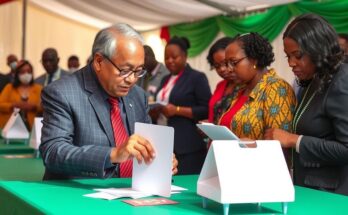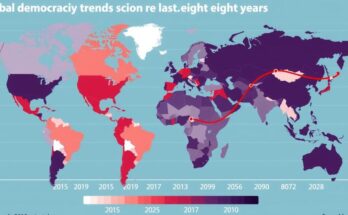The Lobito Corridor project aims to connect Angola, Zambia, and the DRC to facilitate mineral transportation. While local leaders herald it as an economic boon, widespread skepticism exists about its impact on the Congolese communities, with fears of exploitation overshadowing potential benefits. The disparity between international promises and local realities raises significant concerns regarding the project’s fairness and long-term sustainability.
The Lobito Corridor project, extending from Lobito, Angola, through Zambia to the mineral-rich Democratic Republic of the Congo (DRC), is spurring mixed reactions among local populations. While the project promises enhanced regional trade and job creation, many Congolese express skepticism about its actual benefits to the community. Local analysts caution that the Corridor may facilitate neo-colonial exploitation of the DRC’s natural resources rather than equitable development. Amidst these concerns, DRC President Félix Tshisekedi champions the project as a crucial opportunity for economic growth, emphasizing potential job creation and improved infrastructure. However, the disparity between projected benefits and existing realities casts doubt on whether the Lobito Corridor will ultimately serve the interests of the Congolese people or perpetuate external dependency. Reports suggest that the DRC, despite its substantial mineral wealth, remains one of the poorest nations, with the majority of its citizens struggling to meet basic needs.
The Lobito Corridor is an ambitious infrastructure initiative linking Angola’s Lobito Port to DRC’s mineral provinces via a 1,300-kilometer railway, intending to boost trade and facilitate quicker access to key minerals like cobalt and copper. The project, supported by the United States and involving several African nations, aims to enhance regional connectivity and attract foreign investment. Yet, local sentiments are deeply divided, with concerns about potential exploitation of resources by foreign entities overshadowing the projected economic benefits. The DRC, despite holding vast natural resources, remains plagued by poverty, raising critical questions about the true beneficiaries of such international agreements.
The Lobito Corridor presents a complex case of potential economic opportunity juxtaposed with fears of neo-colonial exploitation in the DRC. While some local leaders advocate for the project’s anticipated benefits, numerous community members and analysts express deep skepticism about the arrangement’s fairness and long-term impact. The DRC’s rich mineral deposits require careful negotiation and inclusive policies to ensure that the benefits of such projects enhance local livelihoods rather than serve as vehicles for external profit. Without addressing these underlying concerns, the project risks exacerbating existing inequalities and regional tensions.
Original Source: www.aljazeera.com




